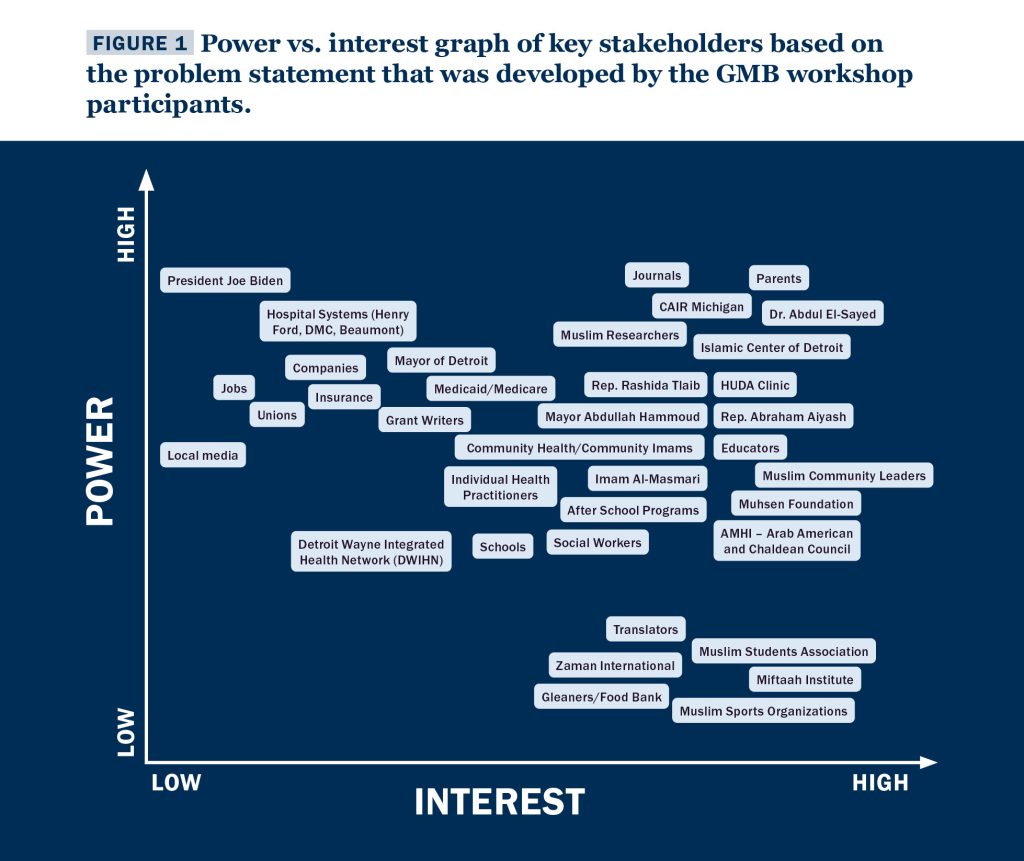The Community Research for Health Equity (CRHE) program, managed by AcademyHealth and funded by the Robert Wood Johnson Foundation (RWJF), supports community-led research to address local health care system issues of importance to communities of color, people with disabilities, LGBTQ+ individuals, and other historically marginalized populations.
Over the past year, we have been featuring interviews with CRHE grantees to showcase and celebrate their work during relevant celebration and recognition months. In the seventh blog of this series, we are highlighting grantee the Institute for Social Policy and Understanding to review their project and celebrate community-led research during National Arab American Heritage Month. ISPU used community-based system dynamics (CBSD) to explore unique health-related inequities faced by the minoritized Muslim communities in Southeast Michigan and to generate potential solutions to these problems with the community. ISPU recently released a report with the findings from their study conducted between 2022 and 2024, which you can find here.
“At the Institute for Social Policy and Understanding, we envision an America where Muslims are thriving and equal,” said Erum Ikramullah, Senior Research Project Manager. “We believe that relevant, rigorous research in the right hands will help get us there...we bring both research expertise and deep roots and connections within Muslim communities across the United States.”
The purpose of ISPU’s study was to empower Muslims in Southeast Michigan with the knowledge and tools to advocate for accessible, equitable, unbiased, and quality health care in their communities. To achieve this purpose, the ISPU team coordinated a Group Model Building (GMB) workshop with diverse stakeholders which is highlighted in this previous AcademyHealth blog. The team then developed accessible communication tools, based on the workshop participants’ suggestions, to disseminate their study’s findings. These tools were created to be used by community members and local organizations. ISPU is currently organizing community events and engaging with pertinent stakeholders to circulate their findings to the broader Southeast Michigan community.
Insights and Recommendations from Collaborative, Community-Led Workshops
The workshop participants formulated the problem statement: Which factors affect health care access for Muslim communities in Southeast Michigan? to inform their investigation. They identified various stakeholders and factors impacting healthcare access and developed a Power vs. Interest graph based on these discussions. Based on their investigation, they determined that there are multiple pathways to address an outcome or variable of interest to American Muslim communities and key stakeholders in the health and health care system, as evidenced in the causal loop diagram on page 19 of their report. Additionally, they found a general lack of trust in health care professionals and stakeholders that might be able to address feedback loops through specific policies or programs.

“We’ve learned a lot,” said Ikramullah. “Through workshops with the community, we identified barriers Muslims in Southeast Michigan face when trying to access health care, ways to reduce those barriers, and also ways to promote those factors related to increased access to health care.”
The ISPU team developed the following recommendations for the local community and policymakers in southeast Michigan, taking into consideration both the insights of the workshop participants and community leaders:
- Design and implement new ways to increase the ability of American Muslims to access, afford, and trust the healthcare system.
- Design and implement prevention strategies that prioritize the demographics, immigration experience, and socioeconomic makeup of neighborhoods.
- Address hard-to-reach and minoritized populations.
- Increase the number of Muslim community health workers (CHWs).
- Holistically address social determinants of health.
- Build bridges with community organizations, healthcare systems, and local governments.
According to the final report the ISPU team noted that, “The systems approach helps communities identify which factors to address for closing gaps in outcomes or shifting outcomes in a positive direction.” This project is not only unique because of its community-led focus, and community-identified findings, but also because the community has been involved in choosing how to disseminate and implement their findings in their communities.
Since publishing the report, the ISPU team organized a public event presenting their findings at the Arab American National Museum in Dearborn, Michigan. The gathering brought together policymakers, health care experts, and community leaders to discuss and benefit from the study’s findings. Moving forward, they plan on reaching out to local health systems and other policymakers with the findings from their project to advance their goal of ensuring Muslim communities have productive and positive health care experiences.
“The commitment to see this project through reflects the need for this type of research,” Ikramullah noted. “As mentioned in our report, ‘Systems-level innovations often emerge among communities with the capacity and resources to design and implement innovations in communities. This report is a testament to the Southeast Michigan community of American Muslims who have the capacity and resources to systematically address barriers to health care.’ The work is only beginning now, as we work with the community to make sure it reaches the right hands.”
If you would like to read more about ISPU’s CRHE grant, you can view that here. To watch an interview with CRHE project team member Erum Ikramullah on the value of community-led research, you can view that here. Earlier posts in this series featured CRHE grantees during Pride Month, Disability Pride Month, National Disability Employment Awareness Month, National Native American Heritage Month, Black History Month, and World Teen Mental Wellness Day. This work is made possible with a grant from the Robert Wood Johnson Foundation (RWJF). The views expressed here do not necessarily reflect the views of RWJF.